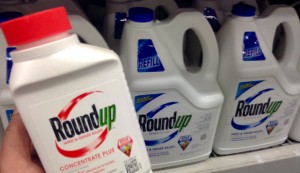06
May
EPA Releases then Pulls Its Report that Disputes Cancer Finding for Glyphosate (Roundup)
(Beyond Pesticides, May 6, 2016) Last week, the U.S. Environmental Protection Agency (EPA) published a long awaited review of glyphosate, the active ingredient in Monsanto’s Roundup, concluding that the chemical is not likely to be carcinogenic to humans —then the agency removed the review from its website. After pulling the report, the agency stated that the document was not final. In March 2015, the International Agency for Research on Cancer (IARC) released its findings that show glyphosate to be a probable human carcinogen.
 The 86-page report was published Friday on regulations.gov by EPA’s cancer assessment review committee (CARC) and was reviewed by Reuters. While the report finds that glyphosate is not likely to be carcinogenic to humans, EPA told Reuters that it took the action it did because the assessment was not final. According to Reuters, “The agency said the documents were ”˜preliminary’ and that they were published ”˜inadvertently.’” But, a cover memo, which was part of the assessment, described the report as CARC’s final cancer assessment document. “Final” was printed on each page of the report, which was dated October 1, 2015. This only furthers speculation that EPA has concluded that it will renew glyphosate’s registration. The European Union has indicated that it will re-approve glyphosate’s registration, despite fierce public outcry.
The 86-page report was published Friday on regulations.gov by EPA’s cancer assessment review committee (CARC) and was reviewed by Reuters. While the report finds that glyphosate is not likely to be carcinogenic to humans, EPA told Reuters that it took the action it did because the assessment was not final. According to Reuters, “The agency said the documents were ”˜preliminary’ and that they were published ”˜inadvertently.’” But, a cover memo, which was part of the assessment, described the report as CARC’s final cancer assessment document. “Final” was printed on each page of the report, which was dated October 1, 2015. This only furthers speculation that EPA has concluded that it will renew glyphosate’s registration. The European Union has indicated that it will re-approve glyphosate’s registration, despite fierce public outcry.
Glyphosate has been subject to widespread public scrutiny since IARC classified it as a 2A probable carcinogen based on animal studies. A scientific review was released in February 2016 by a group of 14 scientists, which expressed concern about the widespread use of glyphosate-based herbicides (GBHs), the lack of understanding regarding human exposure, and the potential health impacts. According to the report, U.S. agencies, such as the National Toxicology Program, the Centers for Disease Control and Prevention, and EPA, have not adequately kept up with cutting-edge research. The researchers call for the global science and regulatory community to step back and take a fresh look at glyphosate due to widespread exposure patterns.
Glyphosate residues have been detected in foods and products that are not typically associated with heavy glyphosate use, or even in organic foods and products, in which the use of glyphosate is prohibited. In March 2016, Moms Across America released a report on glyphosate residues in California wines. The report finds that all of the ten wines test positive for glyphosate. Other recent reports of the widespread presence of glyphosate residues find the chemical in breast milk, in German beers, feminine hygiene products, and bread, as well as in nearly 100% of Germans tested.
While glyphosate is touted as a “low toxicity” chemical and “safer” than other chemicals by industry, it has been shown to have detrimental impacts on humans and the environment. Given its widespread use on residential and agricultural sites, its toxicity is of increasing concern. A mounting body of data has found that formulated glyphosate (Roundup) products are more toxic than the active ingredient, glyphosate, alone. Roundup formulations can induce a dose-dependent formation of DNA adducts (altered forms of DNA linked to chemical exposure, playing a key role in chemical carcinogenesis) in the kidneys and liver of mice. Human cell endocrine disruption on the androgen receptor, inhibition of transcriptional activities on estrogen receptors on HepG2, DNA damage and cytotoxic effects occurring at concentrations well below “acceptable” residues have all been observed. A 2008 study confirmed that the ingredients in Roundup formulations kill human cells, particularly embryonic, placental and umbilical cord cells, even at very low concentrations, and causes total cell death within 24 hrs.
Two days ago, a large coalition of national organizations delivered over 500,000 petitions to EPA that demands an end to glyphosate use in the U.S. The groups held a rally outside the White House before marching over to EPA headquarters. The event, organized by Moms Across America and Care2, was also joined by Beyond Pesticides, Organic Consumers Association, Friends of the Earth, SumOfUs, and CREDO Action.
It has previously been announced that U.S. federal testing will begin for glyphosate residues in food. Although a positive step, this move is largely seen as political — a response to growing public pressure and not focused on evaluating health concerns. Beyond Pesticides urges individuals concerned about glyphosate exposure to support organic systems that do not rely on hazardous carcinogenic pesticides. In agriculture, concerned consumers can buy food with the certified organic label, which not only disallows synthetic pesticides like glyphosate, but also the use of sewage sludge and genetically engineered ingredients. Instead of prophylactic use of pesticides and biotechnology, responsible organic farms focus on fostering habitat for pest predators and other beneficial insects, and only resort to judicious use of least-toxic pesticides when other cultural, structural, mechanical, and biological controls have been attempted and proven ineffective.
Source: Reuters
All unattributed positions and opinions in this piece are those of Beyond Pesticides.











I find incredible that in the US food is not being tested to see if glyphosate in present in it. To me is just common sense. It definitely shows how powerful chemical companies are.
May 6th, 2016 at 9:48 am